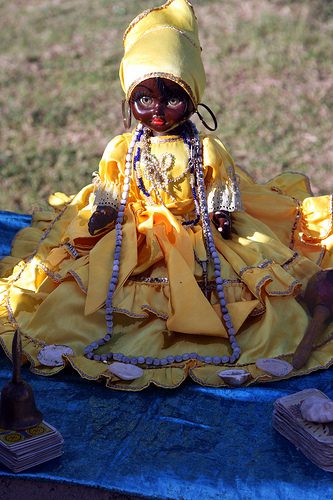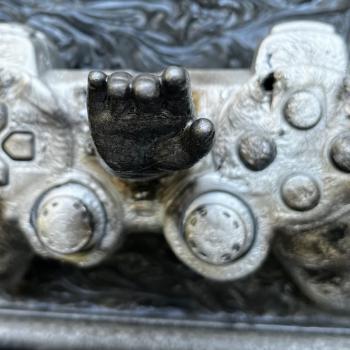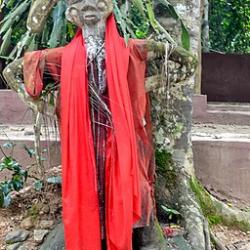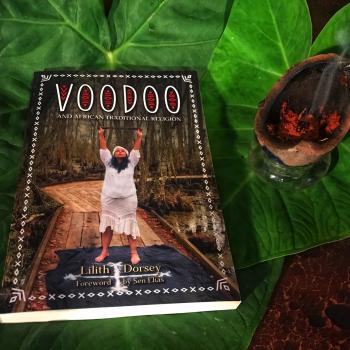
A Way of Life
Santeria, more correctly known as Lucumi, is a religion, a tradition, a way of life. It has at it’s core a belief in the existence of Ashe, a universal life force which permeates all things. There is the Ashe of divine fire, represented by the Orisha Chango. The sweet river is the Ashe of the love goddess Oshun flowing to her followers. Everything, absolutely everything, contains it’s own sanctified energy and it is all connected.
When Will It End?
Those not in “Santo,” or practicing the religion, would probably be surprised to discover the dedication involved in the practices. People spend years studying the songs, dances, rhythms, herbal preparations, chants, symbols and related elements of the religion. Initiations are a lifelong process, with more levels and elements of the tradition employed throughout the years as called for. The first process an individual receives is a head washing, or Rogacion, which symbolizes their cleansing and rebirth into Santeria. This washing may be repeated throughout a person’s life.
Everybody Clean Up!
Many Santeria practitioners employ the use of sacred herbal baths as part of their spiritual practice. There are sweet baths for bringing in good Ashe, and bitter baths for removing negativity which contain ingredients like sage, sea salt, and laundry bluing. There are also baths specific to each of the Orisha, or Gods and Goddesses. It’s obvious cleanliness is very important. The first sacred items that are given during an initiation are the elekes, or necklaces. These are washed and fed, and placed on the person as part of the rites. There are very specific conditions as to when they are allowed to be worn, and they are not to be touched by others who do not follow the same restrictions.
Beware the Unexpected Crone
I do a lot of Pagan events, lecturing on things like Voodoo, Santeria, Paranormal Photography, and Sci-Fi, as well as leading ritual, giving psychic readings etc., and they always make for an interesting story. That’s an understatement. Some years back I was standing on the dinner line at an event, waiting for my turn at the troughs, when a older Norse crone lady approached me and grabbed my elekes saying something like “how unusual.” I shook my head and proceeded to ask her two unpleasant questions “Ok, are you still menstruating? And have you had an orgasm today without showering afterwords?” The answer was a quick “ no, oh not for a long time, to either question.” Then I proceeded to explain that the necklaces, also known as elekes. were holy items to me, not to be touched by outsiders who may not observe our taboos. In Lucumi, or Santeria, sex and spirituality are kept completely separate. So all those highly sexualized myths about African derived religions are untrue, who would have guessed. (sarcasm) The menstruating female taboo is a bit more complicated to explain. Many feminists have voiced an opinion that this prohibition is sexist and misogynistic. The rule is based on the Santeria divination stories known as Patakis. One version of the traditional tale is about when a group of menstruating powerful women, often referred to as witches, gathered together during their “moon” time and tried to take over the world. Their power and strength during this time made them a serious threat, and only the persuasive love goddess Oshun was able to convince them otherwise. A woman’s menstruation is seen as a time of regeneration and personal power that is not part of the religious practices for the community. In my personal opinion I find it a valuable lesson for women about their own power and the need to focus on oneself, at least for a few days a month.
Touch Yourself

The thing that puzzles me is why people from other spiritual traditions have a problem not touching other people’s ritual items. During a recent interview when someone asked me why these prohibitions were in place, I explained the system as I have just done here, and then asked what I feel the real question is, why do you have a problem with not touching our stuff? Do you feel the same when when you enter a Catholic church or a Jewish Temple? Those religions aren’t very big on letting people at their sacred items either. If you have an answer I would love for you to share it below, along with any thoughts you might have on this topic. If you know someone who is a little confused, please share this with them. Acceptance will not come without understanding, and for that we all need to expand our minds.
As always if you enjoy what you find here please remember to like, comment, and share !


















